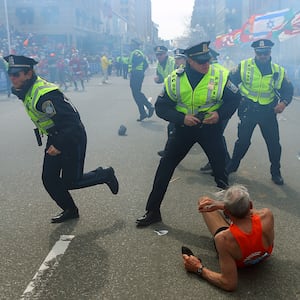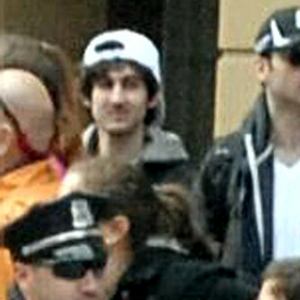Eighteen months before Tamerlan Tsarnaev and his brother carried out the Boston Marathon Bombing, Tamerlan murdered three young men in Waltham, Massachusetts on September 11, 2011. Tamerlan was a boxer, and his primary accomplice in the Waltham murders was a Chechen MMA fighter, Ibragim Todashev, he knew from the gym.
Together they pistol-whipped, hogtied, and tortured Brendan Mess, Raphael Teken, and Erik Weissman, stole their money, and slit their throats. The evidence of their involvement in this horrific, dramatic, carefully plotted crime is overwhelming.

"Ibragim Todashev mug shot from May 4, 2013."
Orange County Sheriff's Office via Getty ImagesThe victims were marijuana dealers who had gathered to watch a Sunday night football game. Brendan Mess had a purple belt in jiu-jitsu, went to the same gym as Tamerlan and Ibragim, and rented the Waltham apartment where he and his two friends were killed. Raphael Teken also lived in Waltham, he came from an Israeli family and was the son of a local Jewish spiritual leader. The third victim, Erik Weissman, was a mild mannered cannabis connoisseur—and a friend of mine. Hibatalla K. Eltilib (“Hiba”) had been Brendan’s girlfriend. She left the state after a violent argument. Brendan told his friends she was gone for good. But Hiba returned to find the bodies the next day, leaving a trail of bloody footprints–and unnerving questions.
More than a decade later, we have yet to reckon with the Boston Bomber’s role in the Waltham murders.
I liked Erik Weissman. But that’s not why I devoted more than eleven years of my life to investigating this story, reporting on the murders for This American Life and Boston magazine, covering the bombing trial for The Daily Beast, creating and producing a three-part documentary for ABC News Studios and Hulu, and most recently authoring a book, The Waltham Murders.
The bombing coincided with a turning point in the widespread use of social media and the dissemination of misinformation. I’m a journalist. The truth matters. And seeking it has only felt more urgent over time. Especially as it became clear that I was the only one actually looking for answers.
The Middlesex County District Attorney’s Office is led by Marian T. Ryan, the woman in charge of the officially unsolved murder case. Ryan insists that her office can’t comment on the bomber’s role in the crime or release any information because they are hot on the chase for other potential suspects.
But in effect, Ryan’s continued silence means that the Middlesex office has yet to be held to account for letting the Boston Bomber slip through their fingers.

A picture of Tamerlan Tsarnaev on a foreign document recovered by police on Laurel Street in Watertown presented at Dzhokhar Tsarnaev's Boston Marathon trial at Moakley` Federal court on Thursday, March 19, 2015.
Matt Stone/MediaNews Group/Boston Herald via Getty ImagesAccording to my own reporting and that of The New York Times, before the bombing, multiple individuals provided homicide investigators with Tamerlan Tsarnaev’s name. Investigators failed to question him. After the bombing, the Middlesex office orchestrated an interview in which Ibragim Todashev was killed shortly after he confessed–another death the Middlesex office has yet to address.
The office’s continued pattern of disinterest and/or inability to effectively pursue leads, before the bombing, in the immediate wake of the attack, and up until today is alarming.
In response to the new reporting in the book Ryan and the Middlesex office are pointing reporters to a trophy list of homicide convictions as evidence of their “unwavering commitment to or ability to solve complex cold cases.” But the Boston Globe recently found actual evidence, from an open unsolved murder, of a teenage boy, assigned to the Middlesex office, left in an abandoned Waltham building.
The DA does not appear to be actively pursuing any leads, as they claim. And yet, there could be accessories to the crime who are still alive.
For those close to the case, questions about Hiba are especially concerning.

Johnson Aimie “Jay” Edosomwan Jr. and Hibatalla K. Eltilib.
Courtesy of AuthorEven though Hiba was living with Brendan, she was married to a man in Richmond, Virginia, named Johnson Aimie Edosomwan Jr. (“Jay”). Throughout her relationship with Brendan, Hiba remained in communication with Jay. After the murders, she visited Jay in his home. His body was found two days later. Documents obtained via FOIA from the Richmond Police Department pertaining to Jay’s apparent death by suicide, reveal alarming questions about Hiba’s potential role in the Waltham murders. I obtained these records last year after producing the docuseries. The DA had these documents in 2011, but apparently never pursued these leads or made inquiries within the victims’ social circles.
For Erik, Brendan, Rafi, and other East Coast distributors of high-grade black market cannabis, 2011 was a year of upheaval and growing tensions. Brendan’s concerns also included his tumultuous love life.
Stories about Hiba spread fast. They reached me in the days immediately after the murders. Brendan had a girlfriend. They had a fight. She left town. She wasn’t supposed to return. She did not have a house key. She asked the landlord to open the door. The rumors Erik’s family heard were more explicit. The theory going around was that “Hiba hired someone to kill Brendan” and that Rafi and Erik just happened to be there, Erik’s mother, Bellie, told me.
After the bombing, theories about Hiba persisted among some of the victims’ associates, at times merging with conspiracy theories about the terrorist attack, reimagined to feature Hiba as some sort of highly connected criminal mastermind or agent.
Brendan was not Hiba’s first, nor her last, romantic partner to meet a violent end. And accounts of Hiba’s other dead lovers compounded the speculation that Hiba may have played a role in the Waltham killings.
On September 1, 2011, ten days before the Waltham murders, Hiba’s ex-boyfriend, Jahmare H. Smith, 33, was shot and killed in Henrico County, Virginia. A man named Jeffrey Runion was later convicted for the crime. Hiba had separated from her husband, Jay, but they remained legally married. Jay died in his Richmond apartment on October 7, 2011, a little less than a month after the Waltham killings. Investigators at the Richmond Police Department determined that Jay had died by suicide.
Five dead bodies in a five-week timespan, all somehow connected to Hiba.
Hiba also spoke of yet another murdered boyfriend. She allegedly told two individuals that a previous boyfriend had been killed in a home invasion.
According to Brendan’s high school friend, Ray Filmore, Brendan found Hiba’s complicated past alluring. Brendan was fixed on having a certain lifestyle, Filmore explained. He was drawn to things that were dangerous. Later the qualities that once endeared Hiba to Brendan would exacerbate his friends’ suspicions.
Suspicions about Hiba appear to be shared by law enforcement, according to two Waltham city councilors and records pertaining to Jay’s death obtained from the Richmond Police Department via FOIA.
The Middlesex County District Attorney’s Office, the office in charge of the officially unsolved triple homicide, insists that the case is still open and investigators are looking into the “potential involvement of additional undisclosed person or persons in connection with these homicides.” The office did not respond to inquiries pertaining to Hiba and Jay. But according to a 2018 GBH News report quoting anonymous law enforcement sources working with the office, “Investigators believe that she knows more than she’s let on.”
But I too have had my share of dark luck and there are reasons to be skeptical about law enforcement’s veiled claims and stated reasons for keeping this case open.
Perhaps Hiba is a victim of circumstance many times over. It’s not a crime to lie to a journalist. The Middlesex office could be using allegations about Hiba as a shield–an excuse to keep this case open, say nothing, and avoid accountability.
And yet discrepancies in the account Hiba provided me regarding her apparent motives, movements, communications, violent arguments with the victims, corroborated allegations of her involvement in a series of complex robberies, eye-witness accounts of her behavior after finding the bodies, attempts to sell the victims’ belongings for profit, disturbing accounts of her actions and financial transactions detailed by her late husband, Jay, as well as Jay’s documented and partially corroborated allegation that Hiba attempted to frame him for the Waltham killings, are troubling. This was a carefully planned crime. All three victims appear to have been targeted–especially Rafi whose home was also robbed the night of the murders. And yet, neither Rafi nor Erik would have visited Brendan’s apartment if Hiba was home.
We all have our types. Hiba apparently preferred men who allegedly sold drugs and also allegedly partook in robberies. She dated risk-takers who lived dangerous lives, so it’s not as surprising that a handful of these men met a violent end as it would be if she liked to date, say, dentists.

Brendan Mess with one of his beloved pit bulls.
Courtesy of AuthorHiba insisted that speculation about her role in the murders is unfounded. “I’m still trying to deal with all of those deaths at the same time,” she said in a 2014 Skype interview. “I feel like I’m being punished because people around me died,” she said. She said she was not a James Bond villain, as others have described her to me, and she had “no involvement” in the Waltham crime. She doesn’t understand how anyone could think that she might. What could possibly be the motive for doing something like that? she asked me. “There is no way that I could ever imagine that happening, let alone orchestrate it.”
Later I would learn of three separate accounts, from three different individuals, alleging that Hiba and Jay had in fact successfully orchestrated a series of complicated robberies prior to the Waltham killings. In two of the alleged robberies they recruited accomplices. In another, a victim was pistol whipped. One of the accounts is supported by police records obtained from the Richmond Police Department via FOIA.
The killers scattered $5,000 cash around the scene of the crime, but they also robbed the victims of an estimated $100,000.
But I knew none of this when Hiba first shared her concerns with me over Skype in 2014. Before the call, Hiba emailed me from her home in Khartoum, Sudan where she said she was volunteering her time on charity boards and working with disabled people and orphans.
I had been trying to reach her for months after hearing concerning accounts from more than a dozen individuals close to the Waltham crime. I detailed some of the substantiated reporting about Hiba in a Boston magazine cover story about the murders. Hiba emailed me immediately after the article went live.
She wanted to clear some things up. She is a victim. She thanked me for my conscientious, objective reporting. But she said she’d loved Brendan, and he’d loved her. He was her angel, and she knew that he was with her at all times. She was devastated by his murder, and after he was killed, she lived in fear—she could have been there.
Regarding the questions about her trip to Miami and her unexpected return, she said that Brendan had known she was coming home. In fact, she tried to get back earlier and would have been there the night of the killings had she been able to obtain a ticket.
She appreciated my diligence. “Without knowing you, I admire you,” she wrote. But she wanted me to leave her out of my reporting. The other journalists didn’t care about the truth like I did, and accounts about her were based on “NO FACTS and NO EVIDENCE.” My reporting was “more dignified than that,” and she cautioned me not to stoop so low as to include her in any future stories.

Erik Weissman.
Courtesy of the Weissman FamilyShe asked me to look at the situation on the flip side: What if she is innocent?
I thought the 2014 interview went well. I thanked Hiba for her time and told her I respected what she had been through. I truly did. “I really respect you too, Susan,” she said.
While speaking to Hiba, I found her account believable. We continued to email back and forth, and she thanked me again for “pursuing the truth.” Later she moved to England. Currently she appears to live in Saudi Arabia where she conducts research and works in education.
Over Skype, Hiba said she understood why I had questions about her movements the weekend of the murders and her other dead lovers. Hiba was not so understanding in February 2022, when I invited her to appear in The Murders Before the Marathon documentary.
In 2014, Hiba suggested that her clashes with the victims were due in part to racism. More than a half dozen of the victims’ associates who expressed concerns about Hiba were Black. Still, I thought Hiba’s concerns could be warranted. In addition, Hiba’s family is Muslim, and she was born in Sudan. Her family’s faith caused conflicts with Jay’s family, who are Christian. Tamerlan Tsarnaev also had verbal arguments with Brendan and Rafi about Israel and Palestine. I do not have detailed accounts of what was said, but on one occasion Brendan made a remark, likely in jest, that was undoubtedly offensive. The fact that the bombing was labeled an act of “jihadi” terrorism presents a heightened risk that people may have drawn unfair connections. Pigeonholing the Tsarnaevs or anyone else in this story into a simplistic “jihadi” terrorist narrative misses the point. In any case, when someone makes an allegation about racism or discrimination, I am inclined to believe them.
But my reporting always seemed to lead me back to Hiba. I had yet to obtain Jay’s written allegations. But I’d conducted additional interviews and a spokesperson for the Richmond Police Department handed me a tip, indicating that I should keep looking.
I told Hiba about the Richmond PD’s remarks. Hiba wrote that the questions regarding her potential involvement in the murders were due to no other rational or logical reason other than the fact that she is a Black foreigner with Muslim heritage. She did not agree to be interviewed for the series.
In 2023, I wrote to Hiba regarding reporting in the book and suggested that certain discrepancies could potentially be resolved in an additional telephone interview. I also told her I would include her allegations of prejudice in the book. When I didn’t hear back, I emailed her a detailed list of the reporting. “You may wish to provide comment,” I wrote.
I also asked if she had prior knowledge of a plan to commit a robbery at either Brendan or Rafi’s apartment on the evening of September 11, 2011.
“I am a victim!” Hiba wrote back. She instructed me to “take a long hard look” at myself and called me a “prejudiced,” “racist,” “sens[at]ionalist tabloid journalist.”
Hiba’s allegations about myself and my work are unfounded. If racism is Hiba’s only explanation for the numerous accounts of her violent arguments with the victims, the discrepancies in her account regarding her movements and communications the weekend of the murders, apparent lies to me and others, multiple allegations of robberies motivated by financial gain and personal spite, and additional allegations detailed in police records, then that in itself is telling.
“Your little bullet point list is unfounded and rooted in prejudice and has no bearing on finding the truth,” she wrote. Hiba stated that she has never plotted or engaged in robberies or criminal activities, she has never hurt anyone, or spoken badly about anyone, and she has no knowledge of the criminal activity of others. “I haven’t been arrested nor have I been anything but a victim in all of this,” she wrote.
Contrary to Hiba’s claim that she has never been arrested, engaged in criminal activity, or “hurt anyone,” according to records I obtained in Henrico County, Virginia, she was convicted on a misdemeanor assault and battery charge in 2002. She received a thirty-day sentence.
Hiba’s friends told me they were initially struck by her beauty, her charm, and her international accent. She seemed to know everything and everyone.
Hiba and Brendan met in 2006, while Brendan was visiting Richmond to see his close friend and fellow fighter, a boxer named Ian MacCleod. Apparently, the pair had a casual drunken hookup then Brendan went back to Massachusetts where he had a longtime girlfriend. Hiba dated and later married Jay, who came from a wealthy family of Nigerian church leaders in Fairfax, Virginia.
For many years, Hiba and Jay sold weed together, according to multiple individuals intimately involved in these transactions and a police report alleging that Jay had been a “major marijuana distributor.” But neither Jay nor Hiba were ever arrested or charged with selling narcotics.
Hiba also worked at Saks Fifth Avenue. Jay tried to launch some sort of health food store and was apparently supported in part by his parents. But in early 2011, he was in financial distress, according to an eviction notice and court documents demanding more than $150,000 of unpaid rent for his business and apartment. In March 2011, Hiba tried to annul the marriage. Her request was denied and they never legally divorced. In April, Hiba was living with Brendan in the Cambridge, MA, apartment he shared with his brother and two pit bulls. By May 2011, Hiba and Brendan moved in together in the second-floor apartment of 12 Harding Avenue in Waltham without the dogs.
Because Brendan could not state his real occupation as a distributor of high-grade marijuana on a lease application, Hiba had applied for the apartment. According to the landlord, Charlie Paquette, Hiba lied. She said she worked at a halfway house; but Charlie found out that wasn’t true and when he confronted Hiba, she said that Jay paid her alimony. She told Charlie that she’d initially been too embarrassed about the arrangement to tell the truth. Charlie then spoke to Jay on the phone and Jay told Charlie he sent Hiba $1,200 a week.
And that’s how Brendan and Hiba moved into an apartment in a two-family home on a quiet leafy dead-end street in Waltham.
In the weeks leading up to the Waltham murders, Hiba was in conflict with all three victims. In several instances, these arguments allegedly escalated to violence.
Brendan had invited Erik to stay in a spare room. At first, Erik and Hiba got along. Hiba introduced Erik to Victoria Jackson, her old friend from Richmond, and Erik and Victoria started dating. But then Hiba fought with Erik and stopped speaking to Victoria, even when Victoria came to visit. Hiba told me she was trying to get Brendan to stop selling drugs. That’s why she was fighting with Erik–Erik was trying to get Brendan to “expand.”
In any case, Erik’s arguments with Hiba were why, in the weeks leading up to the murders, he tried to avoid the Waltham apartment and was staying with friends.

The house related to the Waltham murders.
Courtesy of AuthorHiba insisted that, during those weeks, she did not throw a knife directly at Rafi’s head, as others have claimed. That story was “over exaggerated,” she said. She threw the knife across the room, nowhere near him. And she threw it because Rafi made a “racist” remark.
But multiple people close to the couple told me that Hiba was upset at least in part because Rafi was interfering in her relationship with Brendan. At first, Hiba would apparently call Rafi to work through their quarrels and to make inquiries regarding Brendan’s whereabouts. But as the couple’s fights intensified Rafi was no longer interested in playing peacemaker and he let Brendan meet other women at his apartment.
After Hiba threw a knife, he stopped going to Brendan’s when Hiba was home.
Ian, the friend who introduced the couple, told me that he still has “a lot of love for Hiba,” but he would regularly field calls about their arguments. In one instance he received a call from Hiba freaking out because she said Brendan stuffed her in the trunk of a car. When Ian called Brendan, Brendan apparently admitted that he had done just that but said it was only for a second. “Yeah, she kind of freaked out a bit and threw a knife at me,” Brendan said. Ian believed the two of them were playing games, although the games could escalate and get malicious.
I spoke to multiple sources who claim that Hiba threw knives and bottles at Brendan on one or more occasions. Victoria also witnessed Hiba break a glass table and throw items at Jay in a jealous rage. Another associate of Hiba’s claims Hiba threw knives and bottles at another man Hiba dated after the murders, also deceased due to apparent pre-existing medical conditions.
Also in 2011, Hiba was using cocaine, according to four separate accounts including a police report, and that made everything more intense. “They were both completely insane,” Ian told me. But he added, “I think she really loved him.” Hiba declined to comment on allegations she threw knives and bottles at Brendan on more than one occasion or her use of cocaine.
Hiba told me that she and Brendan only had one argument. Otherwise their relationship was “golden.” But she was upset about Erik living in the apartment and Brendan’s drug dealing. That’s why she slashed all four tires of Brendan’s Mercedes-Benz and fled to Miami that weekend. “I was really mad at him that day,” she said. “I knew that that wasn’t the right way to approach the situation,” she added. “That’s why I decided to go take time out.”
Hiba told me that her trip to Miami had been a “breather.” Even though she left for Florida without a return ticket, she’d always planned to come home. She gave me several accounts about the intended length of her stay.
Hiba told me she and Brendan spoke for the last time around 7:30 p.m. on September 11, 2011. She told him she was watching a movie but when she tried to call him back, Brendan didn’t answer the phone. Nor did he answer her calls the next morning when she was about to board the plane.
Brendan did not answer when she landed at Logan Airport either. By afternoon, Hiba had given up on Brendan’s ride.
Hiba did not have a key because she had a habit of losing things, she explained. When she called Charlie, the landlord, he told her that Brendan’s car was outside, and his friends’ cars were there too.
“Will you let me in if he doesn’t open the door?” she asked on the phone, according to Charlie.
By the time she got to the apartment, it was 2:00 p.m. Charlie unlocked the door, and Hiba stepped inside.

The book cover of The Waltham Murders: One Woman’s Pursuit to Expose the Truth Behind a Murder and a National Tragedy.
Photo by PublisherExcerpted from The Waltham Murders: One Woman’s Pursuit to Expose the Truth Behind a Murder and a National Tragedy by Susan Clare Zalkind. Copyright 2024 by Susan Clare Zalkind, published by Little A, and reprinted with permission.







